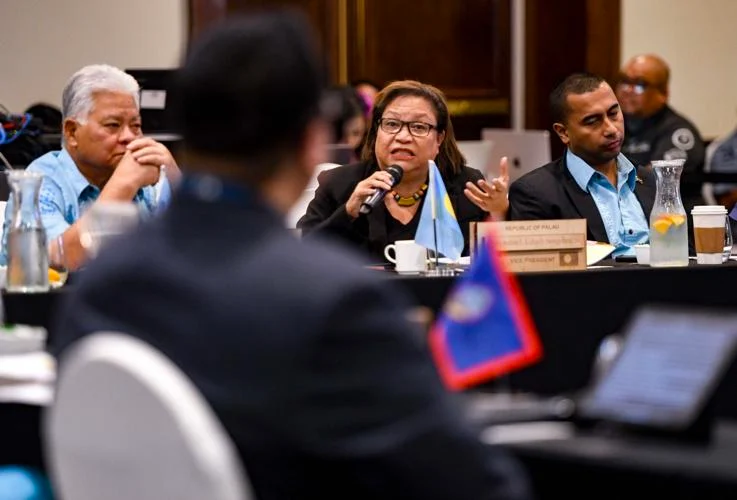A recent cyber-attack on Palau led to the release of 20,000 documents marked confidential onto the internet, Palau Vice President J. Uduch Sengebau Senior told leaders at a regional summit in Guam Tuesday.
Discussion on the second day of the 26th Micronesian Islands Forum(MIF) turned to the potential damage that hackers could inflict on small island governments and critical infrastructure, a concern shared by leaders across the region.
Senior told the Forum that the 14 March cyber-attack on Palau coincided with the island nation signing a renewal of the Compacts of Free Association with the United States.
Thousands of official documents from the Palau government, crew lists for Japanese Navy ships that visited Palau, and documents outlining close relations between Palau and Taiwan had been stolen in the course of the attack, according to Senior.
Hackers also disrupted the ability of the Palauan Ministry of Finance to transfer funds electronically, leaving the ministry rushing to print out paper checks, the vice president said.
Ransomware group DragonForce has claimed responsibility for the cyber attack, but Palauan President Surangel Whipps Jr. has pointed to China as a perpetrator of the attack, the New York Times reports.
China’s Foreign Ministry has called the accusations “unfounded,” according to the Times.
Palau is one of few nations in the world to officially recognise Taiwan as a sovereign state, a sore point for the Chinese government.
Guam has seen its own share of cyber attacks with alleged ties to China, with Microsoft reporting that Chinese-backed hacker group Volt Typhoon has taken to frequently infiltrating telecommunications companies on the island.
Reports produced by the Chinese government have denied involvement with Volt Typhoon.
Other attacks of unclear origin paralyzed the records system at Guam Memorial Hospital and briefly shut down service to Docomo Pacific customers in the first half of 2022.
The ability of faraway hackers to shut down critical assets has Micronesian leaders wary.
“When somebody says that somebody from off-island, away from Guam or the CNMI, or for Micronesia can disable some infrastructure in our areas, that’s cause for real concern,” said Gov. Arnold Palacios of the Commonwealth of the Northern Mariana Islands.
Palacios suggests that forum participants look into what policies the U.S government and other countries had adopted to deal with such threats.
Maverick Eoe, Special Envoy for the Republic of Nauru, said his island had taken to establishing its own national telecommunications carrier in light of previous cyber attacks.
He said relying on private telecommunications providers to handle sensitive information had opened up more possibilities for hackers to attack the system.
Over in the Republic of the Marshall Islands, a newly established National Security Office is meant to be handling all security threats, said RMI President Hilda Heine.
But Heine said there was a greater need for technical assistance and resources to get security up to speed, a sentiment shared by several other leaders across the region.
Guam Governor Lou Leon Guerrero shared some of the work that Guam has been doing to establish an islandwide cybersecurity plan, in collaboration with the federal government. The Port Authority of Guam, and utilities, each likely targets of an attack, all had started up very robust plans, Leon Guerrero said.
Palau’s Senior suggested using the Guam model as a template to create a regional cybersecurity plan for other MIF member nations.
Federated States of Micronesia President (FSM) Wesley Simina said each member nation should focus on beefing up their respective cybersecurity agencies.
“For each individual jurisdiction, we should really have our offices beefed up. And that requires funding, and that requires more expertise, resources. So we need to really be focusing on those,” Simina said.
The two-day Micronesian Islands Forum presented issues on workforce development and transportation, energy, education, healthcare, digitization, and cybersecurity.
The leaders also agreed on the next order of business—establishing a secretary general to administer the Secretariat.
On Wednesday, visiting delegations will engage in field trips to the KEPCO solar farm in Mangilao, the Ugum watershed project, and the G3 Maker Space at the Chamorro Village.
MIF 2024 will then conclude with the signing of the Joint Communique.
The Marshall Islands will be hosting MIF 2025.














